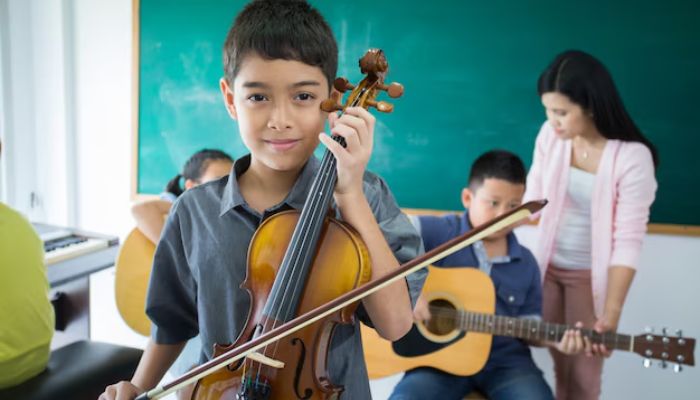Have you ever noticed how music can instantly alter your mood or how a catchy tune can become stuck in your head? Music has a lot of power. But did you know that mastering the right notes is only one aspect of studying music theory or learning to play an instrument? A child’s brain and future success are fundamentally shaped by music education, which affects everything from job performance to math proficiency.
We frequently overlook the critical role that creative and auditory training plays in today’s fast-paced world, where resumes are stacked high with academic accomplishments and tech skills. Beyond the concert hall, the importance of music education is vital because it helps students develop their entire brain and gives them lifelong skills.
- The Symphony in the Brain – Music and Cognitive Growth
- 1. Boosting Academic Performance
- 2. Enhancing Memory and Concentration
- Building Future Skills – Music as a Career Catalyst
- 3. Cultivating Discipline and Perseverance
- 4. Fostering Teamwork and Collaboration
- 5. Sharpening Fine Motor Skills and Coordination
- 6. Boosting Emotional Health and Stress Management
- 7. Unleashing Creativity and Problem-Solving Skills
- The Right Environment – Where Music Education Flourishes
The Symphony in the Brain – Music and Cognitive Growth

The most crucial benefits of music education are usually unseen, taking place inside the minds of students. When a kid learns to read music, play an instrument, and keep a rhythm, they are involving several parts of their brain simultaneously.
1. Boosting Academic Performance
It may sound strange, but music and math are profoundly linked. When a student reads a musical score, they are performing with fractions, patterns, and complicated connections in real-time. The rhythm and timing needed to play a piece are crucially applied mathematics. Studies have constantly presented that students engaged in music programs better comprehend abstract thoughts, which translates directly to enhanced music education and academic performance in subjects such as science and math.
Similarly, music assists with language growth. Learning pitch and sound differences in music increases the capability of the brain to hear and process phonetic sounds, which is a crucial element of literacy and language investment.
2. Enhancing Memory and Concentration
Consider a student who is learning a difficult piece of music and has to commit dozens or even hundreds of notes, rhythms, and dynamics to memory. The brain is trained to retain and recall information through this rigorous memorization process. Additionally, playing an instrument requires intense focus. A musician must concentrate on their instrument, their score, and the sounds of other musicians playing nearby. This improved capacity for concentration is an essential ability that helps with learning and growth in all domains.
Building Future Skills – Music as a Career Catalyst

Even though not all students go on to pursue careers as musicians, the abilities they acquire are highly sought after in today’s workforce. The soft skills acquired through music education are frequently the same qualities that employers look for in leadership positions and learning and development jobs.
3. Cultivating Discipline and Perseverance
It takes countless hours of practice and repetition to become proficient on an instrument. A strong sense of discipline and the importance of hard work are instilled by music. Pupils rapidly discover that their efforts pay off; the more they practice, the better they sound. This idea of tenacity is essential for conquering obstacles in life, work, and education.
4. Fostering Teamwork and Collaboration
Playing in a band, orchestra, or choir teaches students how to work as a team. To produce a harmonious end result, they must pay close attention to one another, modify their volume and tempo, and play their part. They learn from this experience to –
- Actively Listen – To adapt and meet the needs of the group.
- Take the Lead – To understand when to take the lead and when to offer assistance.
- Coordinate Efforts – To cooperate in pursuit of a common objective.
Success in any professional setting, including joint research teams and corporate boardrooms, requires these teamwork abilities.
5. Sharpening Fine Motor Skills and Coordination
It takes extraordinary hand-eye coordination and accuracy to play instruments like the violin, piano, or guitar. To create the desired sounds, the brain and muscles communicate continuously. Young children benefit from the development of fine motor skills, which also helps preserve dexterity and coordination throughout life.
6. Boosting Emotional Health and Stress Management
Music is a potent and healthy way for students to express their emotions and decompress in a time when they are under more and more pressure. Students are constructively interacting with their emotions when they listen to music, play a strong chord, or sing a difficult harmony.
- Emotional literacy – Students who listen to music are better able to identify, comprehend, and communicate feelings that words can’t always adequately convey. One essential element of healthy learning and development is the development of emotional literacy.
- A Natural Stress Reliever – The focused concentration needed to perform a piece is frequently compared to meditation. It diverts the student’s attention from everyday worries and focuses their energies on a constructive, fulfilling activity. Even at elite schools like the Best Boarding Schools in Dehradun, where students are expected to manage rigorous coursework, music classes offer a much-needed mental respite and a long-term stress-reduction strategy. One important, long-lasting importance of music education is the capacity to control one’s emotions and anxiety.
7. Unleashing Creativity and Problem-Solving Skills
By its very nature, music is an artistic endeavor. Mastery enables the student to progress into interpretation, improvisation, and composition, while initial learning entails structure. Making music instead of learning through music has amazing advantages for creative thinking –
- Thinking Outside the Box – The brain is forced to make quick, unconventional decisions during improvisation, which directly improves general problem-solving skills. A musician is creatively resolving a musical “problem” when they create a melody or depart from a score.
- Innovation for the Future – The ability to think creatively on a constant basis is highly valued in all fields, including positions involving advanced learning and development. Candidates who can approach problems creatively are valued by employers, and music training offers ongoing exercise for this particular brain region. One of the main benefits of music education is the freedom it provides, which leads to creative ideas and a self-assured, imaginative outlook on life.
The Right Environment – Where Music Education Flourishes
A child’s learning environment is equally as significant as the subject matter. Music education must be given priority and incorporated into the curriculum rather than being an afterthought if it is to flourish. For this reason, a lot of parents search for educational institutions that support a comprehensive approach.
Institutions frequently place a high priority on extracurricular activities in areas where education is highly valued, such as the scenic Uttarakhand valley. For instance, the best boarding schools in Dehradun are well known for their commitment to a well-rounded education, first-rate music facilities, knowledgeable teachers, and required music courses. These educational institutions recognize that a well-rounded student is ready for success in social and creative as well as academic domains. They understand that funding a top-notch music program is an investment in a child’s future cognitive development.
Also read: The Role of Storytelling in Enriching Education – Inspiring Learning in Dehradun Schools














